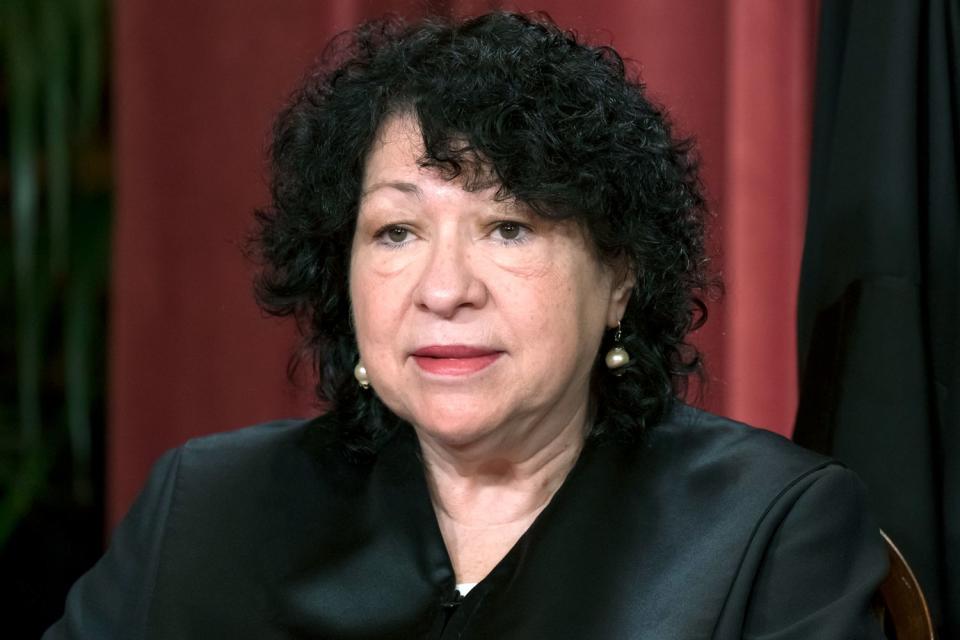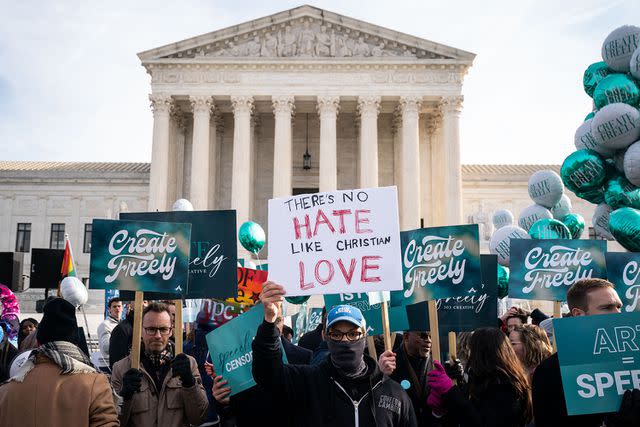Sonia Sotomayor Pens Stunning Rebuke of Supreme Court's Discrimination Ruling: 'Today, the Court Shrinks'
- Oops!Something went wrong.Please try again later.
Justice Sotomayor offered a moving dissent in the Supreme Court's ruling on Friday, which sided 6-3 with a Christian web designer who argued that she should not be forced to design wedding websites for LGBTQ+ clients

J. Scott Applewhite/AP
Justice Sonia SotomayorSupreme Court Justice Sonia Sotomayor offered a striking dissent on Friday in the court's landmark ruling on LGBTQ+ discrimination case 303 Creative LLC v. Elenis.
The court ruled 6-3 in favor of a Christian web designer from Colorado, who cited the First Amendment to argue that she should not be forced to design wedding websites for same-sex clients.
In the dissenting opinion, Sotomayor noted that the ruling is "the first time in [the court's] history" that it granted "a business open to the public a constitutional right to refuse to serve members of a protected class."
She then went on to call recent targeting of LGBTQ+ people "heartbreaking," as she passionately wrote about the negative impact her colleagues' decision will have.

Kent Nishimura / Los Angeles Times via Getty Images
Protestors stand outside the Supreme Court as it hears oral arguments in the case of '303 Creative LLC vs. Elenis' in December 2022The monumental discrimination case was brought by Lorie Smith, a website designer who owns 303 Creative and wanted to challenge a Colorado law prohibiting businesses from discriminating against LGBTQ+ customers.
Smith, whose case was built largely around a hypothetical scenario, argued that she should not be forced to design wedding websites for LGBTQ+ clients because creating messaging that she disapproves of would oppose her religious beliefs and violate her right to free speech.
Smith sued Colorado in an attempt to block the enforcement of its anti-discrimination law. Despite the preemptive nature of her complaint, as she has not yet designed wedding websites or had to turn away same-sex couples, the Supreme Court agreed to hear the case.

Rachel Woolf for The Washington Post via Getty Images
Lorie Smith, the Christian web designer behind a landmark Supreme Court decisionOn Friday, the court agreed with her, with conservative Justice Neil Gorsuch writing in the court's majority opinion: "This Court has recognized that governments in this country have a 'compelling interest' in eliminating discrimination in places of public accommodation. ... At the same time, this Court has also recognized that no public accommodations law is immune from the demands of the Constitution."
But Sotomayor took issue with her conservative colleagues' decision, writing in the dissenting opinion: "When the civil rights and women’s rights movements sought equality in public life, some public establishments refused. Some even claimed, based on sincere religious beliefs, constitutional rights to discriminate. The brave Justices who once sat on this Court decisively rejected those claims."
Related: Justice Sotomayor Expresses 'Growing Concern' for Separation of Church and State
Sotomayor was joined by Justices Elena Kagan and Kentanji Brown Jackson in opposing the ruling, which came on the final day of Pride Month at a time when threats against the LGBTQ+ community have been intensifying.
"Around the country, there has been a backlash to the movement for liberty and equality for gender and sexual minorities. New forms of inclusion have been met with reactionary exclusion. This is heartbreaking. Sadly, it is also familiar," Sotomayor wrote.

With the landmark decision — which falls in line with many of the SCOTUS justices' conservative stances — a precedent has now been set that in certain instances, U.S. businesses can legally deny their services to LGBTQ+ people under the First Amendment.
"To illustrate, imagine a funeral home in rural Mississippi agrees to transport and cremate the body of an elderly man who has passed away, and to host a memorial lunch," Sotomayor wrote in HER dissent. "Upon learning that the man’s surviving spouse is also a man, however, the funeral home refuses to deal with the family."
She continued: "Grief stricken, and now isolated and humiliated, the family desperately searches for another funeral home that will take the body. They eventually find one more than 70 miles away. This ostracism, this otherness, is among the most distressing feelings that can be felt by our social species."
Never miss a story — sign up for PEOPLE's free daily newsletter to stay up-to-date on the best of what PEOPLE has to offer.
Sotomayor also wrote of how, historically, some have discriminated against the LGBTQ+ community "under the backing of the law," noting how, "For most of American history, there were laws criminalizing same-sex intimacy."
"LGBT people have existed for all of human history. And as sure as they have existed, others have sought to deny their existence, and to exclude them from public life," she wrote, adding that "state-sponsored discrimination" was historically made possible by police raids on businesses that accommodated gay customers.
"Time and again, businesses and other commercial entities have claimed constitutional rights to discriminate," Sotomayor wrote. "And time and again, this Court has courageously stood up to those claims—until today. Today, the Court shrinks."
For more People news, make sure to sign up for our newsletter!
Read the original article on People.

